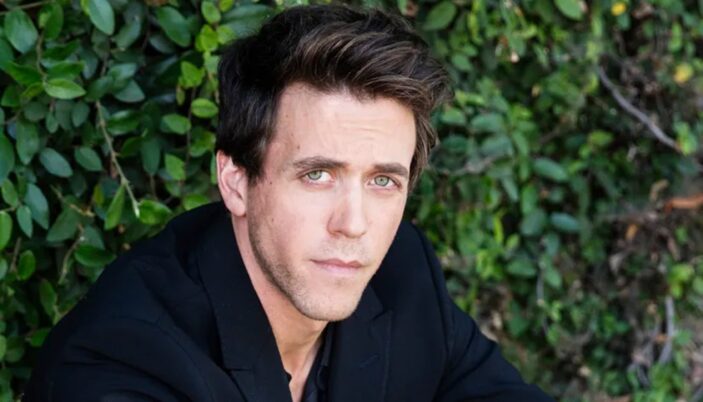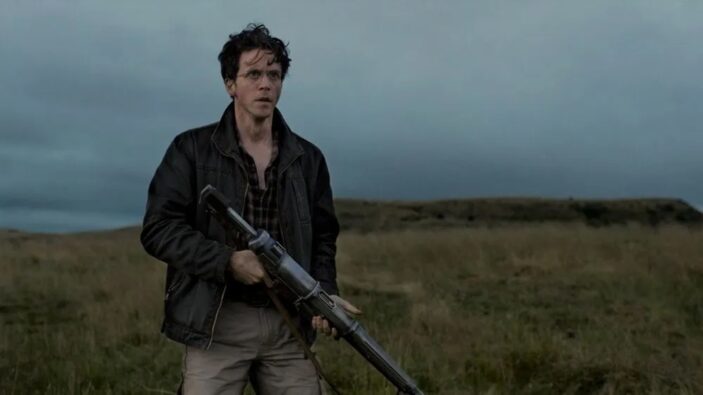
Like many farmers tending to land and livestock around the country, Layla and Jack live an isolated existence. While their son is away at boarding school, Jack experiments with biotechnology to breed cattle, and Layla quietly laments her child’s absence and her strained relationship with her husband. When Jack is injured during a storm-induced blackout – in what he dismisses as an incident with the cattle – Layla begins to probe the true nature of his experiments. As Jack’s controlling behaviour intensifies, an upsetting discovery ruptures the monotony of their rural idyll.
Writer/directors Tom McKeith and Will Howarth have teamed up once again following their warmly received 2015 debut feature Beast for In Vitro. Co-written with star Talia Zucker (Lake Mungo) – who plays Layla alongside Succession star Ashley Zukerman’s Jack – their thought-provoking screenplay tackling the dynamics of possession and manipulation was developed after being selected for the Sundance Screenwriters Lab in 2016. Meanwhile, cinematographer Shelley Farthing-Dawe imbues a haunting energy to the plains around Cooma and Goulburn in New South Wales, which serve as the moody backdrop to this tense, outback-set sci-fi thriller.
As it sets to unnerve and challenge Melbourne audiences at this year’s Melbourne International Film Festival, Ashley Zukerman spoke with our Peter Gray about the multitude of underlying themes present in the film, if his heighted profile in the wake of Succession has altered the roles he’s been offered, and if the enticement of cloning as seen in the film would ever be something he’d personally consider.
Congratulations on the film. Having premiered earlier in the year at the Sydney Film Festival and now at MIFF, are you ever prepared for the reaction from those first-viewing audiences?
You know, I’m just interested because you only ever really know (the reaction) once it’s in front of an audience. Like, I feel strongly about it, and I know what we were trying to do, (but) when you put it in a room full of people, you know a little more about what it means to them. But I just think that there’s so much in (In Vitro). It’s such a good question. I hope that they see everything that we wanted in it.
Obviously the animal replication and cloning is the most obvious theme on a surface level. But there’s the agricultural impact, climate change and domestic violence. I think this could potentially be one of those conversation movies, and that’s such an exciting thing to see.
I’m so glad that that’s what you got from it. For us making it, although there are high-concept sci-fi elements, ultimately it was just about a dysfunctional, abusive relationship. Yes, I think the film is about domestic violence, and it’s about how we use people in the name of love. There’s a very easy kind of connection we can start to make between how we use everything for our own gain and if we only see things from our own perspective for what we want. When we use our animals, we use our planet. We just use for our own needs without actually thinking about the people in between.
That’s what struck me when I first read (the script). (These characters) like the idea of creating animals without the animal even experiencing its life. It’s just solely for the purpose we need. It seems extreme, but it’s not that different to what (people) actually do. It’s the end point thinking of what we’re naturally doing now. Anyway, I’m glad that’s what popped for you.
It was also just the ambiguity of the film too. Obviously it’s more clear as the film comes to a close, but as I was watching that question of who to trust in this situation arises. When you get this script, is there more detail present as to what your character is thinking that we don’t see? Or are you specifically creating those dynamics?
I think what you see is really what was in the script. I think what we were just talking about are the dynamics of the relationship, and this script was the the tip of the iceberg. Will (Howarth) and Tom (Mckeith) and Talia (Zucker) wrote the script, and then the four of us made it. The script then gave clues, but then you start asking “What is this relationship?” and “How does this come out?” It was a fascinating time living in the mind of someone who’s doing that and asking myself, “What would make that person tick?”
I think for my character it’s about extreme co-dependency where he can’t live without feeling loved. He’s got no sense of validation on his own. He’s sort of on the face of it. He’s this vulnerable genius that no one cares about. And when we learn that his partner leaves him, he is nothing. He’s got nothing left. I think there’s a version of this film where this character was more of a villain, but the way we talked about it was that this is a relationship that we honour. Like, “Why does (his wife) stay?”
Was there an ease in working with Talia because she was a co-writer? Does her position allow that approach to discuss your character easier?
They’re old friends of mine, so I knew them before. I think they had been working on this script for about five years at the point it was being made, and I was just so blown away by the fact that they were still so open to (discussions). They weren’t holding onto it tightly. It’s not that I thought I had better thoughts, it was about investigating the ideas they had presented together. It never felt like we were drilling down to the most honest version. It all just came together so organically. I don’t think there was ever a time that we questioned the process.

And that was the same with Tom and Will as directors? Did they hone two different approaches or wavelengths? Or did they work as one?
I think that they did feel like one director, yeah. They kept swapping what their roles were, so it was very nice to see just a looseness between them. They’re two very different people, and I’ve worked a couple of times with two people sharing that head of division before, and sometimes it can feel like they’ve delegated their work individually. That one is responsible for x and one is responsible for y, and it’s usually under the purview of one deals with the people and the other deals with the art. And that’s always felt so strange to me.
But here it felt like the people and the artwork were just very connected. I have to be aware that there’s a lot that I don’t see. They did something that I always appreciate, which is that they protected me. I’m not sure what was behind the surface for them. I don’t know what their experience was like, but I never felt anything other than very creative and excited. I was interested in what was new.
Because you knew Tom and Will, was there an audition process?
It was nice that they came to me and told me they’d been thinking about me for this role. When you see (In Vitro) it’s an interesting observation. But they came to me and very kindly asked me to do it, and it was absolute “Yes” straight away.
I imagine there’s been something of a potential career shift for you in the wake of Succession. Do you feel like you’re being offered more roles in the wake? And are you actively avoiding specific pigeonholing from that?
Yeah. About pigeonholing? I don’t know. It has been very nice lately that I have been able to be attached to projects and help them get (off the ground). That’s a very nice, new thing that’s started to happen. I really enjoy that. It’s a gift that comes with the work I’ve done overseas, and that’s a fairly recent thing that I’m thankful for. In terms of pigeonholing, I do have a pretty deep pool here in Australia, so when something comes to me it’s usually because they’ve seen something in me that makes them feel like I’m right for it.
All the (role) has to do is interest me. All it has to do in pique my interest, and then I’ll find my way into it and find what’s unique about it. If I think a project is worthy, and the people behind it are passionate, that’s all I need.
And going off the film’s thematic of cloning. Taking away the sinister side of it all, would replicating yourself be something you’d want to do?
To clone myself and have a younger version of me? To be younger and live again, it’s so fascinating to me. I don’t think so (though). It feels like a part of growing older is accepting what’s happened and needing to move on. Like, we are all not long for this world, and we just need to accept that. It seems so useful, and regrets are sometimes the worst, but there’s lessons that make us who we are. It’s a fascinating thing about growing older and looking back and wondering about (life). But I do feel like on the other end of that acceptance of what’s happened is good.
In Vitro is screening as part of this year’s Melbourne International Film Festival, running between August 8th and 25th, 2024. For more information head to the official MIFF page.
